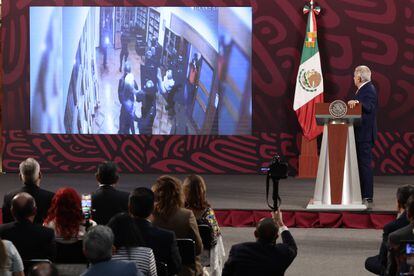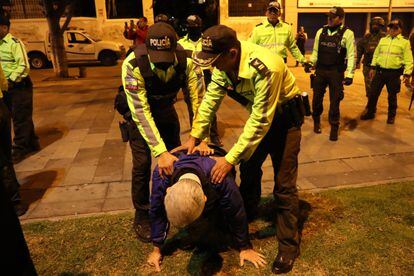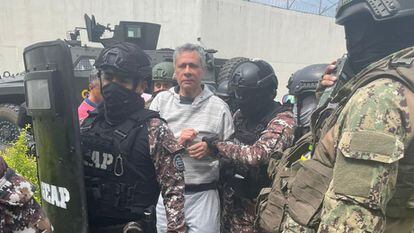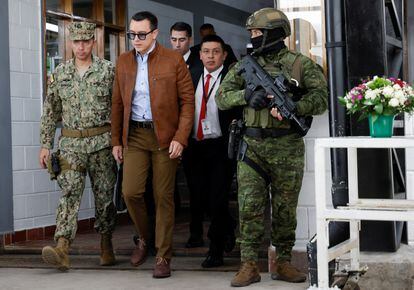
Mexican President Andrés Manuel López Obrador (AMLO) doesn’t like to get involved in international politics. At least that’s what he used to tell reporters. He has made few state visits abroad during his five years in office, avoided thorny regional issues, and even turned a blind eye to abuses in neighboring countries. However, in a surprising shift, he recently took stances on various regional issues. This includes supporting disgraced former Peruvian President Pedro Castillo, criticizing Javier Milei’s election in Argentina, and denouncing Nayib Bukele’s heavy-handed security measures in El Salvador. Now, with less than six months left in his term, AMLO is butting heads with Ecuadorian President Daniel Noboa after he authorized police to break into the Mexican Embassy in Quito and arrest former Vice President Jorge Glas who had sought asylum there. This widely condemned incident has shined a global spotlight on Latin American diplomacy, and led Mexico to file a complaint with the International Court of Justice in The Hague.

The friction began months before the whole world saw images of Mexico’s top diplomat in Ecuador being shoved to the floor by Ecuadorian police. When Jorge Glas sought refuge there last December, a rancorous back-and-forth ensued that escalated tensions between the two countries. Since embassies are considered sovereign territory under long-standing international law and tradition, no one expected what would happen next. After Mexico formally granted asylum to Glas on April 5 and requested his safe passage out of the country, Noboa ordered Ecuadorian security forces to surround the embassy.
Suddenly, the unimaginable happened as a dozen agents wielding long weapons leaped over the Embassy walls, forcefully seizing Glas. In their path, they menaced and brandished arms at the Mexican diplomatic staff attempting to intervene. “When they were finally leaving, I think that was when they hit me in the eye. I have a mark here from being hit with a body-length shield,” said Roberto Canseco in disbelief. Canseco is Mexico’s head of consular affairs and the highest ranking diplomat present since Ecuador expelled Ambassador Raquel Serur earlier in the week.

Mexico immediately cut diplomatic ties with Ecuador. Noboa’s drastic move received swift condemnation from many countries in the region. The United States and Canada showed a more reserved response initially, but took a firmer stance following the release of security camera footage by López Obrador. Mexican Foreign Minister Alicia Bárcena underscored the brutal images of the embassy raid: “Not even the dictator Pinochet had dared to enter the Mexican embassy in Chile,” she said, referring to the late Chilean dictator Augusto Pinochet.
Bárcena then took the lead in Mexico’s counterattack by seeking support in regional forums and international arenas. It garnered strong condemnation of Ecuador from the Organization of American States (OAS) and solid support from the Community of Latin American and Caribbean States (CELAC). Bolstered by the European Union, the United States, and Canada, Mexico lodged a formal complaint with the International Court of Justice. It also requested Ecuador’s suspension from the United Nations, and expulsion if found guilty of violating the U.N. Charter. The López Obrador administration also accused the Noboa government of intercepting embassy communications.
In seeking sanctions for Ecuador, Mexico isn’t alone. Former Ecuadorian President Rafael Correa has joined in, even though he was recently accused by Labor Minister Ivone Núñez of treason. Correa urged international sanctions over the embassy attack to support his friend Jorge Glas, who is on a hunger strike in Guayaquil’s high-security La Roca prison, per his legal team.
Glas will remain in prison for now, after a court rejected his plea for habeas corpus, claiming his embassy capture was illegal. Glas’ attorneys requested his transfer to another embassy, but the court dismissed the appeal. Even though the court said his detention was “illegal and arbitrary,” they ordered him to serve an eight-year sentence for corruption.

The diplomatic crisis has caused more impact outside Ecuador than within. The country continues to face political and judicial scandals that have further polarized public opinion. “People who claimed international organizations were useless are now relying on them, while those who once touted them are now questioning their authority,” said political analyst Pedro Donoso. There is no public opinion data on how Ecuadorians view the events at the Mexican Embassy, but it has impacted the relationship between the country’s political parties.
President Daniel Noboa has clearly upended the political landscape during a pivotal election year in which he’s also a candidate. As violence escalates and fatalities mount, he faces a crucial test in an upcoming referendum about using the military to curb rampant violent crime. And that’s when the country might start feeling “something subtle yet significant — the Ecuadorian government losing credibility,” said analyst César Febres Cordero. “Apart from the sanctions, this can really make diplomacy tricky when Ecuador urgently needs allies to tackle transnational organized crime.”
Mexican politics are also dicey this year with presidential elections in September. Presidential frontrunner Claudia Sheinbaum (Morena party), lost no time in condemning Noboa’s assault on the embassy. “It’s totally unacceptable, goes against every international protocol, and violates our country’s sovereignty. There’s no other way to put it,” she said at a recent rally. “We all witnessed the despicable scenes at the embassy and commend our diplomatic corps for their brave actions.”

The effects of Ecuador’s diplomatic disaster are being felt in the country’s legislature. Former President Rafael Correa’s opposition MOVER party saw three of its legislators recently switch to other parties. The defectors may align with Noboa’s ruling ADN party, which strengthened its numbers from 14 to 26 members. Despite being a minority, ADN has successfully passed crucial bills for Noboa almost unanimously. “The government’s game is very interesting — it outmaneuvered MOVER by passing five laws and ultimately snatched away a few assembly members,” said Donoso. While it’s hard to pinpoint if the conflict with Mexico caused this, “it does show what the government is willing to do and how the rules of the game have changed.”
Amidst power shifts in the legislature and Ecuador’s efforts to justify its assault on the Mexican Embassy, a resurgence of violence grips the streets. Two massacres in 24 hours left 14 people wounded in Guayaquil and Durán, hotspots of organized crime. Families struggle to afford basic necessities as prices surge due to VAT hikes and speculation, while unemployment rates are at a two-year peak. The Ecuadorian people continue to endure daily hardships, while Mexico prepares to hold the nation’s leaders accountable in The Hague.
Sign up for our weekly newsletter to get more English-language news coverage from EL PAÍS USA Edition